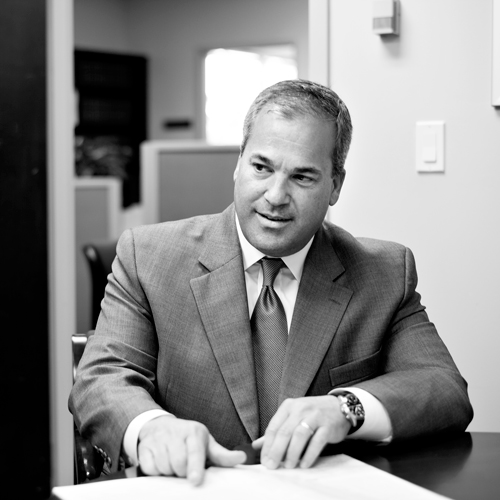Many adjectives could be used to describe a lawyer’s job at a communications company, but “glamorous” is usually not one of them. The position entails stacks of paperwork to comb through, negotiations to discuss, and regulatory channels to navigate. Still, an undeniable undercurrent of excitement was evident in Mark Nielsen’s team at Frontier Communications when the company acquired AT&T’s wireline, broadband, U-verse, and satellite TV operations in Connecticut for $2 billion in the last quarter of 2014. “We’re a $5 billion-per-year company, and AT&T is much bigger, $100-plus billion,” Nielsen says. “Sometimes it felt like it was 50 people on their side of the table and three on ours.” He stops and smiles. “In other words, a fair fight.”
Nielsen, Frontier’s general counsel, senior vice president, and secretary, is proud of his team, and rightfully so. They were instrumental as Frontier sought regulatory approval for the AT&T acquisition and integrated those services into Frontier’s offerings. Included in the purchase were all of AT&T’s wireline and U-verse operations in Connecticut, where Frontier has been headquartered since 1946 but never served a customer base. It was a major purchase for the company, though not its largest acquisition. In 2010, led by chairman and CEO Maggie Wilderotter and president and COO Dan McCarthy, the company tripled in size after an $8.6 billion, 14-state acquisition from Verizon Communications that established Frontier as a market leader. Frontier’s acquisition of territory from AT&T is a continuation of the company’s evolving offerings. “Frontier has great expertise in integrations and conversions,” Nielsen says. “We fundamentally believe in our wireline and broadband offerings, and our approach is customer-oriented. This transaction just proves, again, what we do well.”
Nielsen joined Frontier after the AT&T deal was announced, but the work to solidify the agreement was far from over. The transaction needed approvals from federal and state officials to prove the company would be a good corporate citizen and create value for Connecticut customers. Nielsen is no stranger to working with public officials; he served in the Connecticut state senate in the 1990s and was Mitt Romney’s legal counsel and later chief of staff when Romney was governor of Massachusetts. Nielsen’s experience working with community leaders was a key part of Frontier’s successful integration into the Connecticut market.
Another crucial step was to cooperate with Communications Workers of America (CWA), the largest media labor union in the United States. Approximately 3,000 CWA employees at AT&T in Connecticut transferred to Frontier. Nielsen and executive vice president of human resources Cecilia K. McKenney met with leaders from the organization shortly after the deal was announced and had a long, detailed conversation in which both sides laid out their needs and expectations. After a series of negotiations, they reached an agreement. “They wanted assurance that workers would be respected and valued at Frontier,” Nielsen says. “We succeeded in giving them that assurance.” CWA publicly supported the acquisition. In return, Frontier promised, among other things, employee job security, a guaranteed workforce size, and the addition of 85 union jobs. To welcome employees and make them true “owners” of the company, Frontier offered 100 shares of Frontier stock for every union employee upon closing of the transaction.
There were many official terms and strategies that defined the integration of the two workforces, but on the ground, it was much more personal. A team of Frontier workers prepared intensively for the deal to close so the two teams could come together seamlessly. “It was an enormous amount of prep work, and it was underway on a 24/7 basis for months,” says Nielsen, the pride in his voice unmistakable. One thing he didn’t worry about that usually manifests during an acquisition was a culture clash. AT&T (formerly known in the region as the Southern New England Telephone Company, or just “SNET” to locals) and Frontier have both been in Connecticut for many years. Nielsen lives in Ridgefield, a town of about 25,000 near the state’s southwest border, and other company leaders and employees are scattered around the state. “I’m from Connecticut and have probably been to all 169 towns in the state,” Nielsen says. “I know Frontier is going to do very well here.”
Customers see that personal connection, Nielsen says, and he’s confident they appreciate working with a company headquartered in their community. Frontier is engaged in current Connecticut events in a way other companies couldn’t be. For example, several large storms—Hurricane Sandy and Hurricane Irene come to mind—have hit New England in the last few years. When a disaster like that cuts off customers from their telephone and Internet capabilities, they won’t hear assurances from company executives enjoying the sunshine of Southern California or Texas. The person they talk to will be in their own county, know exactly what they are experiencing, and fix it. Perhaps that’s not the showiest or catchiest sales pitch a company has ever used, but customers don’t need a glamorous utility provider. They need a neighbor. For the first time, customers in Connecticut are about to have one.


